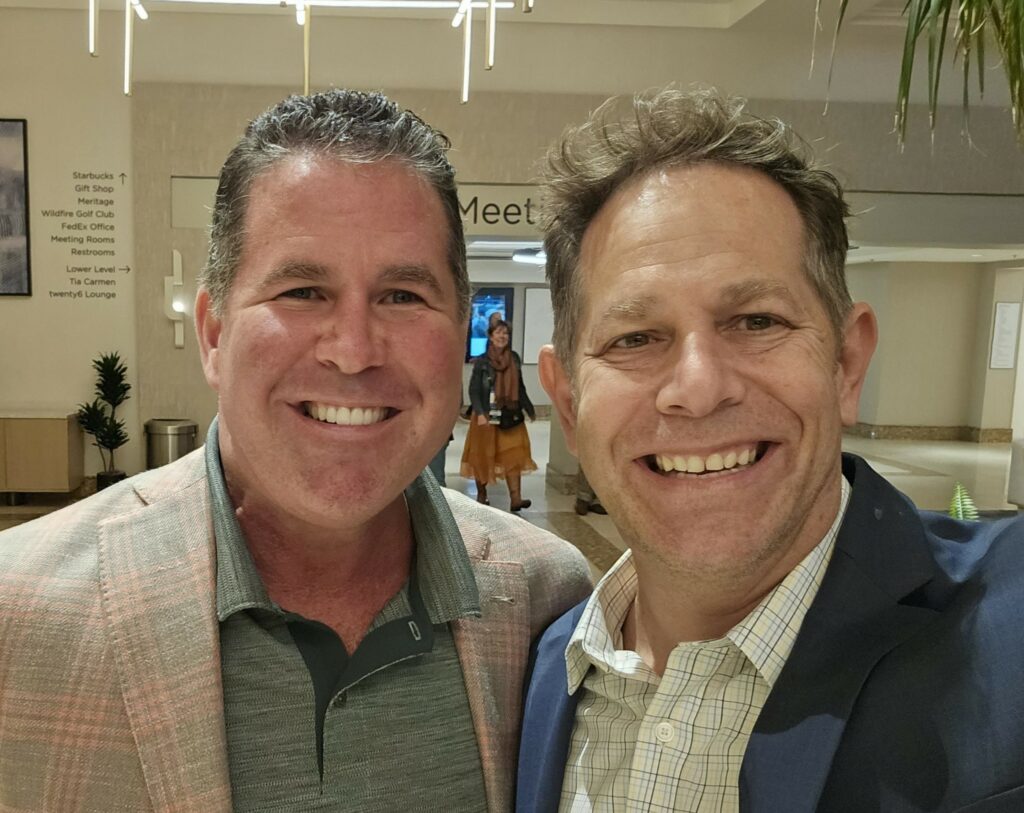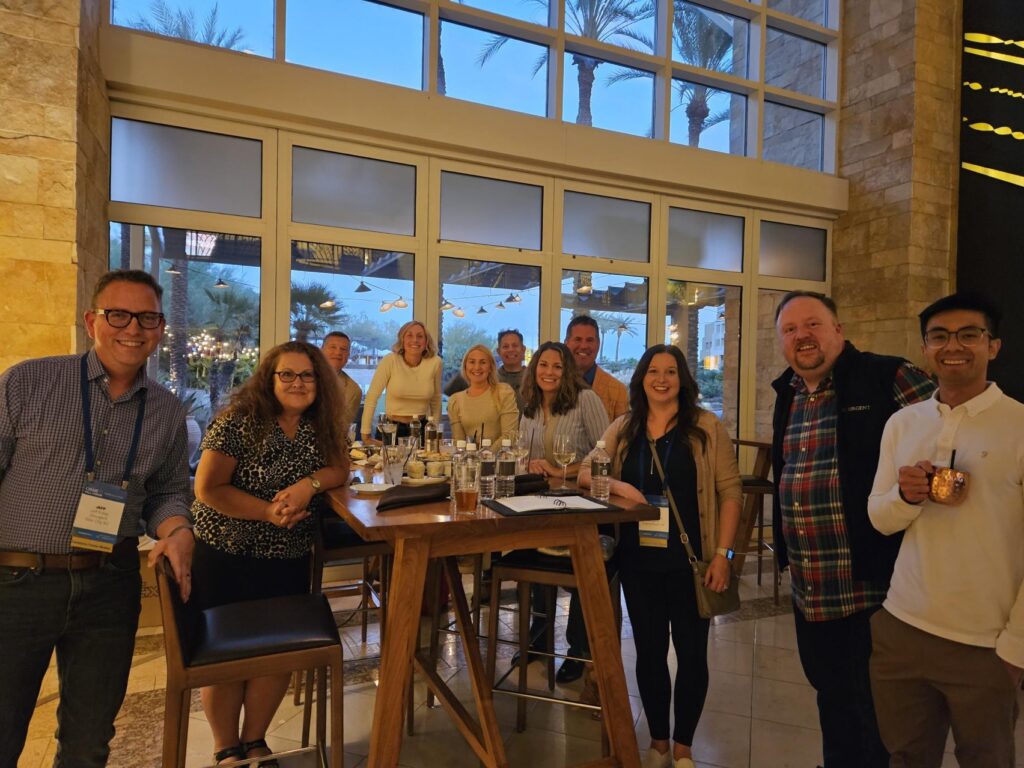In the heart of the Arizona desert, the College of Healthcare Information Management Executives (CHIME) held its latest Fall Forum conference from November 9 – 12 in Phoenix. Far more than your average conference, this annual gathering has become a central hub where Chief Information Officers, healthcare leaders, and industry partners unite to share insights, spark innovation, and accelerate the evolution of healthcare technology.
Along with Divurgent’s founders CEO Colin Konschak and Board Member Philip Felt, the attending Divurgent team – Wendy Hoffman, Joe Grinstead, Dave Wattling, Chris Alberto, Sarah Brandt, Jeff Fuller, Jessica Hadley, Liz Keller, Colleen Watson, Brittany Williams, and Rebecca Woods– arrived early, swung on the fairways for the charity golf tournament, hosted a focus group, and were ready to meet with and make new friends.



Didn’t make it to CHIME’s 2023 Fall Forum? Or maybe you did, but are interested in a recap? Below the team dives into the conference’s top takeaways that are essential for everyone to know.
Insights from CHIME 2023 Fall Forum
AI, AI, AI
Artificial Intelligence (AI) took center stage at CHIME, with leaders showcasing how AI is no longer just a trending topic. It’s an innovative technology, fast-tracking healthcare toward enhanced decision making, operational efficiencies, and personalized patient care – among countless other opportunities. And it’s sticking around for the long-haul.
Leaders agreed that AI is healthcare’s greatest recent tech achievement, but distinguishing between what’s hype and what’s realistic was often discussed. Amidst the craze, an insightful lens was brought forth: separate visionary promises from tangible, actionable, ‘doable right now’ outcomes. While AI has proven to hold almost endless potential, it’s crucial for organizations to discern what’s practical to implement now while the AI landscape evolves.
And further still, the true potential of AI will lie in its industry-wide adoption, successful organizational change management, and data governance initiatives. Of critical importance is the need for good, quality data in order to create meaningful AI outcomes.
It’s important to acknowledge the elephant in the room: no, AI is not out to take all of our jobs. But the symbiotic relationship between humans and AI does need some recognition. It was emphasized that AI itself isn’t self-regulating, meaning the human touch remains indispensable. The billowing narrative became “AI is a tool, not our replacement.” As AI gradually becomes more ingrained in healthcare, the need for human oversight, interpretation, and ethical consideration will only amplify.
Don’t Silo Your Data Analytics
In healthcare, data isn’t merely a byproduct, it’s what enables healthcare organizations to make vital decisions. At CHIME, it was repeatedly emphasized how critical the role of data and analytics plays in deciphering local and global health trends, enhancing patient health outcomes, and optimizing operational workflows – among many others.
To recognize value and enable better decision-making, it’s essential for organizations to begin tracking robust KPIs, ROI, and patient health metrics. Many organizations already have the tools and data to do this, but the knowledge is often siloed. Worse still, hospitals are using only a small fraction of the data that is available because the rest isn’t designed for reuse.
Determining a data strategy that enables organizations to fully use, and reuse, their available data is key. To do this, it’s crucial to first understand problems in their entirety before implementing solutions. Equally important is encouraging transparency and collaboration between departments and supporting a wider community of resources.
Tech for Easing Staffing Shortages and Burnout
CHIME Fall Forum also shone a much-needed spotlight on the human element of healthcare by addressing the strain being placed on our healthcare professionals. Burnout has long been a top issue in healthcare. Compounding this issue is low staffing levels, something that has been further amplified since the pandemic.
As complex as it is, the difficulties in hiring nurses, clinicians, and staff is leading to more work for these already overburdened teams. The healthcare industry’s backbone are these dedicated workers. And much like with analytics, understanding the root problems causing these challenges is paramount before investing new strategies and solutions.
Though there was a resounding recognition that technology, when harnessed thoughtfully, becomes the powerful ally for healthcare professionals. Discussions circled on the impacts that existing and emerging technologies have on alleviating these burdens through optimizing workflows and operations while empowering patient care.
Technologies like robotic process automation (RPA) are increasingly being turned to ease workloads. By automating common tasks like patient scheduling, data entry, and claims management (just to name a few), RPA is significantly reducing time spent on tasks. This in turn enables healthcare professionals to focus on what matters most – providing quality care to patients.
And while implementing or optimizing time saving technologies is essential for healthcare workers, there’s a new technology that many organizations are beginning to consider – generative AI. With the potential to complete patient forms, enter shift notes, discharge summaries, and a multitude of other administrative work, Gen AI has the ability to properly free up the schedules of over-burdened clinicians.
These technologies and strategies must become a top priority. Its this attention to our heroic healthcare workers, the initiatives to make their already demanding roles more streamlined, and the enhancement of patient care that will propel the healthcare industry forward.
Meet the Author

Amanda Sorg | Copywriter & Content Manager
Amanda is Copywriter & Content Manager at Divurgent. She focuses on strategizing and creating impactful, meaningful content that drives the connection of readers and clients to the Divurgent community and offerings. She received her Bachelor of Arts degree in Psychology and Anthropology from the University of North Florida and holds certifications in Digital, Content, and SEO Marketing. To learn more about Amanda, visit her on LinkedIn.


